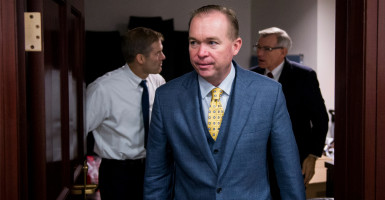Before the House of Representatives votes on a bill that could bring the controversial Export-Import Bank back to life, lawmakers will address measures aimed at, among other things, boosting the agency’s financing for small businesses and diversifying its portfolio.
The House was set to vote today on 81 amendments to a bill reauthorizing the Highway Trust Fund, and 10 of the amendments address how the Export-Import Bank operates. Republicans introduced all of the measures pertaining to Ex-Im, and six of those were introduced by Rep. Mick Mulvaney, R-S.C.
Ex-Im’s charter expired June 30, but legislation to revive the government bank is attached to the highway funding bill.
A standalone bill renewing the bank’s charter appeared to be going nowhere in the Senate, where Majority Leader Mitch McConnell said he wouldn’t bring it to the Senate floor for a vote.
Instead, McConnell, R-Ky., urged colleagues to use the highway funding bill as a vehicle to reauthorize the bank.
The House began debate on the Highway Trust Fund yesterday and voted on 21 amendments to the bill. Lawmakers were scheduled to vote on 81 more amendments today.
Ex-Im provides taxpayer-backed loans and loan guarantees to foreign countries and companies for the purchase of U.S. products. The bank was met with opposition this year from Republicans who argued that it was an engine of cronyism and corporate welfare.
After lawmakers allowed the bank’s charter to expire, Democrats and moderate Republicans mounted an effort to bring the bank back to life through a device called a discharge petition. They were successful in the House, where legislation sponsored by Rep. Stephen Fincher, R-Tenn., passed last week.
Supporters of the bank say Ex-Im assists small businesses in competing in the global market and creates jobs in the U.S.
Here’s a rundown of the 10 amendments that House Republicans proposed to address Ex-Im:
Lynn Westmoreland, Ga.: Would require Ex-Im’s Board of Directors to discuss comments from any U.S. company that alleges that it will “suffer economic harm” from a transaction the bank proposes. Also calls for the board to allow a representative from the company to go before it to discuss the damage the company may suffer.
Rep. Mick Mulvaney, S.C.: Would prohibit Ex-Im from offering credit to foreign countries or companies that don’t “meet competition” from another country’s export credit agency.
Mulvaney No. 2: Would require a company or person seeking more than $10 million in financing from Ex-Im to have sought financing from the private sector and to have been turned down by at least two private financial institutions before receiving loans, loan guarantees, or credit.
Mulvaney No. 3: Would prohibit the bank from extending financing to foreign companies that receive subsidies from a foreign government, if that government has a “sovereign wealth fund” of more than $100 billion. Defines a “sovereign wealth fund” as an investment fund owned by a foreign government.
Mulvaney No. 4: Would require Ex-Im to cover all losses it incurs, as opposed to the Department of the Treasury. Currently, the first $100 million in losses is covered by the bank, and the second $100 million is covered by the Treasury.
Mulvaney No. 5: Would cap the percentage of financing a company can receive from Ex-Im at 10 percent in a fiscal year, meaning that a sole company cannot benefit from more than 10 percent of the bank’s transactions in any given year. Also would cap the amount of financing a single industrial sector—such as aviation or manufacturing—can benefit from at 20 percent for a single fiscal year.
Intended to diversify Ex-Im’s portfolio, the amendment takes veiled shots at Boeing and General Electric, the bank’s two biggest beneficiaries. In 2013, Boeing benefited from 30 percent of Ex-Im’s financing, and General Electric benefited from 9.5 percent.
Ed Royce, Calif.: Would prohibit Ex-Im from providing loans, loan guarantees, and credit to state sponsors of terrorism.
David Schweikert, Ariz.: Would require the bank to use fair-value accounting principles.
Ex-Im has come under fire for its accounting to calculate profits.
Keith Rothfus, Pa.: Would require large U.S. companies benefiting from Ex-Im financing to guarantee repayment of, or pledge collateral for, a percentage of the dollar amount the bank extends.
Scott Perry, Pa., and Mulvaney: Would require the bank to increase the percentage of financing it extends to small businesses by 5 percent each year for four years. Would prohibit loans that are more than $100 million if the bank does not comply.
About 20 percent of Ex-Im’s transactions benefit small businesses, which are defined by the bank as companies employing up to 1,500 workers in some industries.


























